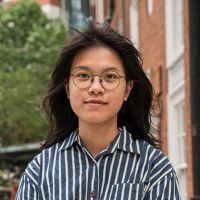7 min read
We sat down with Jingtong, who took IR207: Development in the International Political Economy, to hear about her time on the course and her favourite parts of studying it.
Why did you decide to attend LSE Summer School?
Since I want to apply to a postgraduate programme at LSE, I thought that attending LSE Summer School in advance would be an opportunity for me to get an early impression of studying at LSE (especially the structure of the courses, the way the classes are conducted, and the facilities available at the school) as well as living in London as an international student.
Why did you choose your course?
Since my major is in international relations and IR207 also deals with many important global issues, such as the environment and global population, I’d hoped to gain some new inspirations and perspectives surrounding studying international relations. The most important thing to me was that this course has a gender and development component, which is something I really want to study as a postgraduate, so it was nice to have an introduction to this ahead of applying for my postgraduate degree.
Tell us about an average day as a student on your course.
Usually there are two sections within a day, a small class in the morning, called a seminar, for one and a half hours - this class was taken in small groups and led by the teaching assistant, who gave us some questions related to the content of the previous day's lecture for discussion, and then each group debated its own point of view, and finally the teaching assistant would summarise, which helped us to consolidate our knowledge. In the afternoon, we would have a lecture for all the students on the course, of about two and a half hours, and the professor would talk about one topic per day (this course includes about 12 topics).
What was your favourite part of your course?
I liked that my classmates came from different countries and had different academic backgrounds, so I was able to hear a lot of fresh perspectives when participating in the group discussions of the course. This diversity meant I heard many different views on international issues, which deepened my understanding of a lot of these during the process of exchanges with my classmates, and broadened my perspective on various global issues.
What advice would you give to students considering your course?
When browsing the course webpage, you can download a document about the course structure and content in advance, in which the professor provides the reading list. I’d recommend exploring this and diving into the reading list ahead of the course, to get familiar with the theories and frameworks you will be discussing in lectures. You will use these readings to inform your own thoughts, and they will help you have more engaged discussions when you arrive in the classroom.
This course also requires a high level of written communication skills, so for students who have not studied in the UK before, try to attend the English courses before your session to understand some of the requirements of UK universities for essay writing.
What are your short-term professional goals, and how does your course contribute to these goals?
I am currently aiming to apply to LSE for my postgraduate studies in the future, and through this course I will be able to understand the curriculum and teaching style of LSE, and what shortcomings I still have in my studies, which will help me to better prepare for my postgraduate application and postgraduate studies in the UK.
In addition, I would like to volunteer with international organisations to contribute to the solution to global issues such as women's empowerment and environmental pollution, etc. This course has deepened my thinking about these issues, which will be helpful for me when engaging in volunteer work.
Was meeting and talking to other students on your course easy?
It's generally easy to communicate with other students because everyone is very nice and friendly, and we would talk to each other in class about our experiences at Summer School. Of course, sometimes there can be language barriers as we are all from different countries, but it was a relatively rare occurrence, and we would all try to be open and understandable in our communications.
What would be your top tip for future Summer School students?
It's important to strike a balance between studying and having fun during the three weeks. There's a lot to explore in London, as well as a lot of activities organised by LSE Summer School, but the class and study schedule are also very intense, so you need to be clear about what you want to get out of Summer School and then make a comprehensive plan.
How did you find the course and teaching experience at LSE?
LSE's teaching methods and assessment standards for students are very different from those of my previous school. During Summer School, I felt that the teaching focused on two way communication, and the assessment was focused on essay writing. It was helpful to experience this teaching style, as I want to study in the UK for my postgraduate degree, even though I was not accustomed to it in the beginning.
What was your favourite part of studying at LSE?
I feel that LSE provides great facilities for students. There are plenty of places for you to immerse yourself in your studies and discuss them with your classmates in each of the school's buildings, and the library has a wealth of resources. Studying on the LSE campus is very comfortable and efficient.
This interview was written by one of our 2024 students, who are here to share their stories and help you understand the Summer School experience at LSE.

